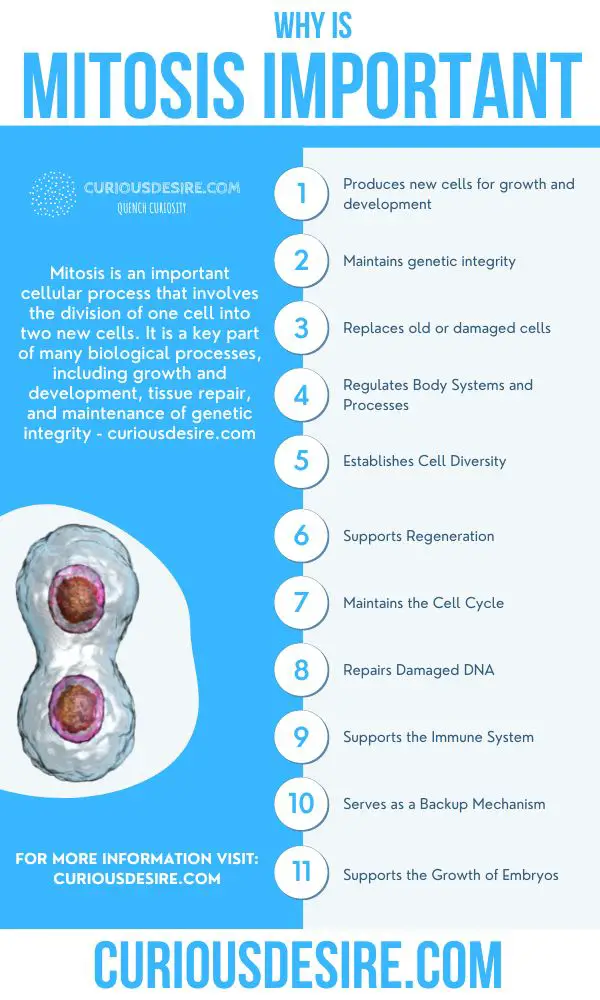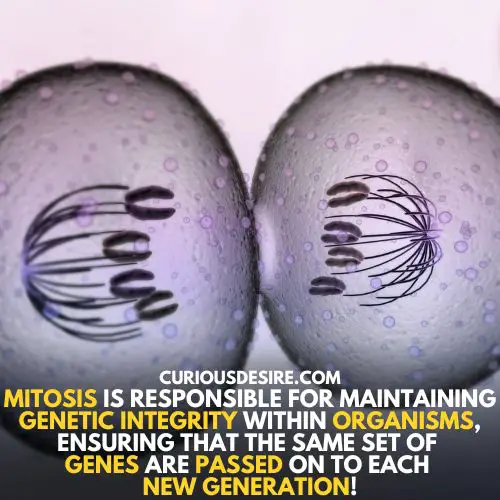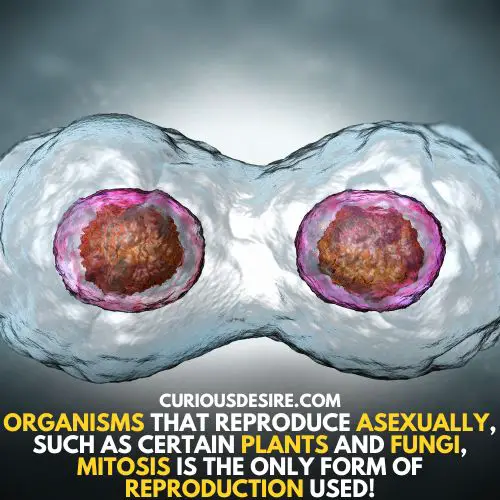Mitosis is an important cellular process that involves the division of one cell into two new cells. It is a key part of many biological processes, including growth and development, tissue repair, and maintenance of genetic integrity.
Here are 15 reasons why is mitosis important in organisms.
15 Benefits of Mitosis that You Should Know
Mitosis is a critical process in the development and maintenance of organisms. Following are some of the most important signs that make it so important:
1. It produces new cells for growth and development
Mitosis is an essential process for allowing organisms to grow and develop. During mitosis, the cell’s nucleus divides into two daughter nuclei, each with an identical set of chromosomes. These daughter cells then divide again until they reach a predetermined number of cells that make up a particular organism or tissue.
It produces exact copies of cells, allowing them to replicate, heal wounds, and replace old or damaged cells.
Through the process of mitosis, cells divide in two and create genetically identical daughter cells. This allows for continuous growth and development as the daughter cells contain the same information as the parent cell.

2. Mitosis maintains genetic integrity
Mitosis is responsible for maintaining genetic integrity within organisms, ensuring that the same set of genes is passed on to each new generation. This is important for passing on genetic information to subsequent generations, which helps ensure that certain characteristics are passed down from parent cells to offspring.
Consequently, it helps maintain a consistent and predictable phenotype in each organism. In addition, mitosis prevents mutations from being passed on, thus maintaining the genetic integrity of the species.

3. It replaces old or damaged cells
Mitosis helps replace old or damaged cells in the body. As we age, our bodies produce new cells to help maintain healthy tissues and organs. Old blood cells, for example, need to be replaced with new ones on a regular basis.
During mitosis, each daughter cell will have an identical set of chromosomes as the parent cell, allowing them to mature and replace the old or damaged cells in the body.
4. It regulates body systems and processes
These cells produced by mitosis ensure that all of the components of a particular system or process within the body remain in balance. The cells that make up the digestive system, for example, need to be constantly replaced as food is processed and digested.
Mitosis is also important for regulating metabolic processes in the body, such as energy production and utilization, cell differentiation, and hormone production.
5. Mitosis establishes cell diversity
Mitosis helps to create a diverse range of specialized cells throughout the organism. As cells divide through the process of mitosis, they can become more specialized and begin to form different types of cells.
Specialization is the process by which a cell develops unique characteristics and functions that are necessary for its role within an organism. This specialization of cells begins during development and continues throughout life as new cells are formed to replace old or damaged cells.
6. It preserves the gene pool
Mitosis is an essential process for allowing organisms to reproduce exact copies of cells and pass on the genetic material to subsequent generations.
By passing down the same set of chromosomes, mitosis helps preserve the gene pool of a species, ensuring that certain characteristics are passed down from parent cells to offspring. This allows for continuity in each organism’s development and in its evolutionary lineage.
7. Mitosis aids in tissue repair
After an injury or surgery, mitosis helps to repair damaged tissues by creating new cells to replace the ones that have been lost. Mitosis is particularly important for skin and other organs, as it helps to continuously replenish these tissues with new cells.
Skin cells, for example, need to be replaced every few weeks in order to keep the skin healthy and functioning properly. In addition, the process of mitosis helps repair wounds by producing new cells to replace those that were damaged or lost.
8. Mitosis supports regeneration
In some organisms, such as amphibians and certain species of fish, mitosis is essential for allowing these organisms to regenerate lost body parts. Through the process of mitosis, cells can be rapidly produced in order to replace those that have been lost or damaged during the regenerative process.
This is important for restoring the body back to its original form and allowing these organisms to survive injuries or other environmental factors that can cause harm.
9. It maintains cell cycle
The process of mitosis is an integral part of the cell cycle, which is a complex and highly regulated series of events that govern the growth and division of cells. During the cell cycle, cells undergo a series of changes as they progress through different stages: interphase, prophase, metaphase, anaphase, and telophase.
Mitosis is the process that occurs during metaphase and anaphase, which involve the division of chromosomes into two daughter cells. This allows for the duplication of genetic material and keeps cells cycling through the cell cycle in order to maintain the number of cells necessary for the proper functioning of an organism.
By participating in these processes, mitosis ensures the continued health and functioning of cells, tissues, and organs throughout an organism’s lifetime.
10. It repairs damaged DNA
Mitosis is an essential process for helping to repair damaged DNA that has occurred due to environmental factors or mutations. It allows cells to divide and create exact copies of their genetic material. By duplicating the chromosomes, mitosis helps to ensure that any damage to the DNA is not passed on to subsequent generations.
During cell division, the chromosomes are first replicated and then the damaged section of DNA can be replaced with the undamaged version.
11. Mitosis supports immune system
Mitosis is essential to the production of new cells for the immune system, which plays an essential role in keeping us healthy and preventing disease. As cells divide through mitosis, new cells are created that are specific to immune functions, such as recognizing pathogens, producing antibodies, and activating white blood cells.
Through these processes, the immune system is able to protect the body from harmful viruses and bacteria.
12. It is Important for Asexual Reproduction
In organisms that reproduce asexually, such as certain plants and fungi, mitosis is the only form of reproduction used. Asexual reproduction does not involve the formation or fusion of gametes in order to produce offspring. Instead, it relies solely on cell division through mitosis in order to produce new individuals.
Therefore, by allowing for the duplication of genetic material and the production of new cells, mitosis is essential for asexual reproduction. Through this process, organisms are able to quickly reproduce in order to expand their populations.

13. It Supports the Growth of Embryos
During embryonic development, mitosis is essential for the growth and development of an organism. By rapidly producing cells, mitosis allows for efficient growth and ensures that important organs are formed correctly.
It also produces a wide variety of different cell types which are necessary for performing specific functions in the body. For example, muscle cells are produced through mitosis and they are responsible for providing the body with movement.
By providing an efficient way to produce new cells, mitosis supports the growth of embryos and helps ensure that organisms develop correctly.
14. It Serves as a Backup Mechanism
Mitosis serves as an important backup mechanism in case of injury or illness. When certain cells become damaged due to environmental factors, mitosis can be used to replace them and restore the body back to its original form.
This helps organisms survive traumatic injuries and other environmental threats that could otherwise cause serious harm. For example, if a person gets burned, mitosis can be used to help regenerate the skin cells in order to heal the wound.
15. Allows for Organ Transplants
Mitosis also plays an important role in the process of organ transplants. By dividing and producing new cells, it ensures that organs are able to retain their functionality after being removed from one person and transferred into another.
Organ transplants are essential for helping people with serious medical conditions such as kidney failure or heart failure. By allowing for the replacement of damaged or defective organs, mitosis helps to save many lives each year.
There are various other uses of mitosis that are not mentioned here. Ultimately, it is an essential process in the life cycle of many organisms and its importance should never be underestimated.
Conclusion
In conclusion, mitosis is an essential process that helps keep organisms alive and functioning. By allowing for the duplication of genetic material and the production of new cells, it ensures that the body remains healthy and can repair itself in times of injury or illness.
From embryonic development to repairing damaged DNA, mitosis plays a crucial role in the lives of all living organisms and is essential for their continued health and functioning. Without it, life as we know it would not be possible.